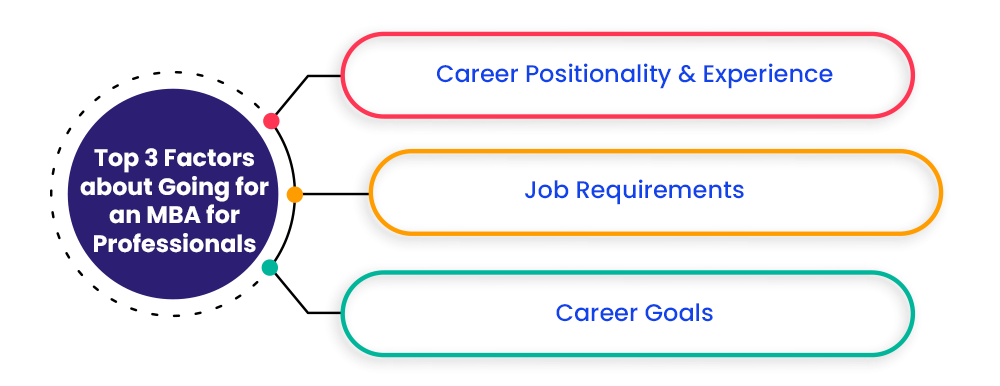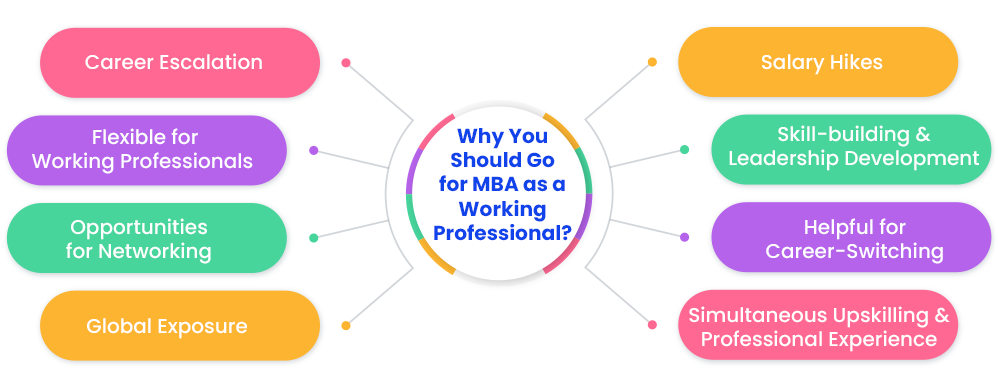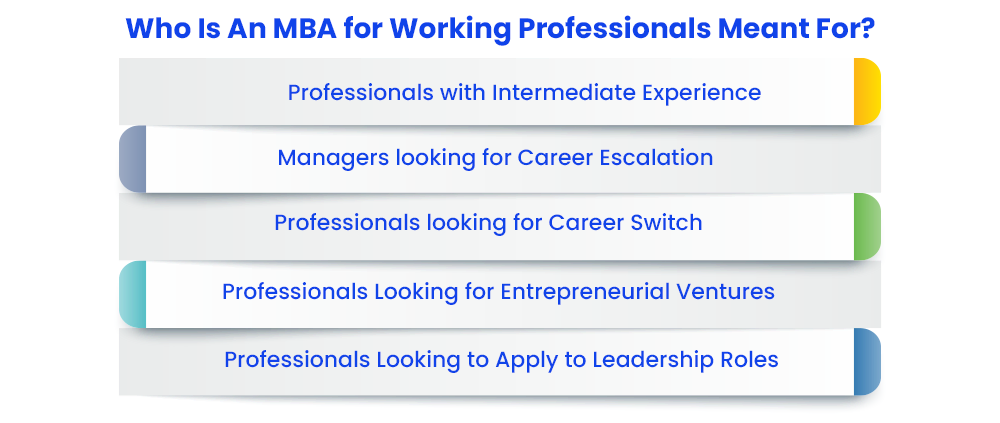Expert Interviews
- University Reviews
- Career Guide
 Video Counseling
Video CounselingImportant Facts
- Ask any Question - CV Forum

Is an MBA for Working Professional Worth It?
College Vidya Team Jan 11, 2025 1.4K Reads

In today’s fast-paced corporate world, the ambition to escalate to the top managerial positions in one’s career is much desired. But despite one’s growing efforts and areas of expertise, working professionals may often find themselves enmeshed in a stagnancy that is difficult to escape. While professional experience is certainly important for promotions and career growth, adding to one’s formal qualifications can be a great factor smoothing the pathway to career escalation.
If you are a working professional wondering about whether you should pursue a degree, specifically an MBA while you have already gained working experience, then you have landed at the right spot. Continue reading to understand whether it is worth it to go for an MBA as a professional or not. Delve deep with us into the feasible alternatives you can explore for adding to your professional qualifications while continuing to work at your job!
Should a Working Professional Go For an MBA?
The very first question that a working professional may ponder about whether they should go for an MBA in the very first place. While the need to enhance one’s resume and qualifications is certainly essential, you need to consider a few more factors about your own personal career positionality and career needs to understand if you should go for an MBA or not!
Here are a few scenarios along with suggestions about whether going for an MBA is the right choice for you or not.
|
Career Positionality |
Whether to Pursue an MBA or Not? |
|
Working professional in a non-managerial entry-level role |
Should gain a few years of experience before going for an MBA |
|
Working professional in a non-managerial intermediate role |
Can consider MBA for career escalation or career switch |
|
Working professional in an intermediate managerial role |
Should go for an MBA for career escalation |
|
Working professional in a senior managerial role |
Should Only Go For an Executive MBA if Required in Job Role |
|
Working Professional with intermediate experience seeking career switch |
Should Go For an MBA if looking for Managerial Jobs |
|
Working Professional Looking for Entrepreneurial Opportunity |
Should go for an MBA, preferably in Entrepreneurship Specialisation |
|
Senior Manager/Executive Looking for Leadership Role/CXO Role |
Should go for an Executive MBA in Leadership and Strategy Specialisation |
Note: The given use cases present a few of the many possibilities or career positions working professionals may find themselves in. The ultimate decision about whether to pursue an MBA or not depends on the unique personal career needs and job requirements of the professional.

Top Benefits of Pursuing an MBA as a Working Professional
While we have discussed whether it is the right choice to go for an MBA or not if you are a working professional, there remain some undeniable benefits that pursuing an MBA can confer to you if you are a working professional. Following are a few of the advantages that you can garner while continuing to work at your current job position and pursuing an MBA degree alongside.
- Accomodating for Working Professionals
Institutions providing MBA courses are now recognising the unique needs and constraints that working professionals are functioning under with respect to job obligations and are hence providing more flexible options for completing the degree. Many reputed institutions, including the likes of IIMs, XLRI, ISB etc. are now providing MBA courses for working professionals (which shall be discussed further in detail) that allow the professional to manage coursework alongside their job efficiently.
- Career Escalation
This is one of the primary aims with which professionals often pursue an MBA alongside their job. While skills and growing years of experience are very essential aspects of escalating through the career ladder, without the required qualifications, a career stagnancy can occur for many job roles. If you wish to escalate through operational job roles to managerial job roles, then an MBA can be a very useful addition to your educational profile since it is a comprehensive degree that trains the student in fundamentals of management and nuances of managing specialised domains. Hence, an MBA can help you traverse the corporate ladder effectively.
- Developing Effective Leadership Skills
An MBA program acquaints the student with various aspects of management, ranging from effective conflict resolution, streamlining of company operations, managing large teams to leading the way towards organisational vision. An MBA is a thorough and comprehensive learning experience that can foster leadership skills in the student. Hence, if you are a working professional looking to enhance your leadership skills, then pursuing an MBA can provide you the right education and training in addition to your existing skill set needed to thrive in a leadership position.
- Networking Opportunities
When you pursue an educational or professional degree in management, it provides you the much coveted opportunity to find and interact with like-minded aspirants and professionals in the field of management, thus widening your professional network. In today’s corporate world that thrives on networking, getting a diverse exposure to peers at different stops of their career journey can be an opportunity to expand your network for both academic and professional growth.
- Exposure on a Global Level
With the opportunities available in the educational domain today, such as going for an online MBA, a global MBA or even an Executive MBA, you get the opportunity to not only learn from esteemed faculty and professionals across the globe but also interact with peers from various backgrounds. Such an exposure at a global level can be highly instrumental for developing a global perspective, enhancing one’s skills at par with standards prevalent internationally and network with professionals from across the world.
- Opportunity for Career-Switching
Many professionals working in various departments in a company may aspire to switch their careers to pursue managerial roles, as these roles have the highest potential of salaries as well as escalation to the top executive positions at the workplace. However, simply having working experience is not sufficient to apply to managerial positions since it requires the candidate to also have formal education and training in management. Pursuing an MBA alongside your current job role and then applying for a managerial position boosts your chances of selection manifolds as you can garner both professional education and training while gaining work experience alongside, thus providing you a competitive edge over candidates having solely work experience or a qualification.
- Higher Compensation
Another key benefit of going for an MBA as a working professional is the handsome salary packages that you can get after completing the degree. Management job roles are one of the most fairly compensated fields–owing to their huge popularity among professionals from various arenas. If you feel that you have reached a stangnancy of earning potential in your current career domain, an MBA can certainly help you apply to job positions with higher compensation packages or even navigate promotions and increments more smoothly at your existing job role.
- Invaluable Combination of Experience and Education
Working in the field alongside while you are learning about the nuances of management can confer you dual advantages–it can help you understand theories and concepts more effectively by connecting them with real-world case studies and the managerial education of the degree can help you navigate the professional problems and issues at your job more effectively. This invaluable combination of simultaneous experience and education can be a major competitive advantage over your contemporaries as it can widen your perspective and skills about management manifold.

As can be clearly seen, pursuing an MBA as a working professional has many unique advantages which may be helpful for navigating one’s career journey. Thus, it is worth it to go for an MBA as a professional provided your current career positionality has a scope for growth through a formal managerial degree.
An Alternative to an MBA- Executive MBA for Working Professionals
Some working professionals may find themselves at a crossroad about how to pursue a full-time degree alongside a full-time job, but many management institutes and top B-schools across India and the globe have realised this constraint. Resultantly, a flexible and work-integrated learning program, an Executive MBA is offered specifically designed to meet the needs of the working professionals.
Here are a few of the key features of an EMBA that make it a useful qualification for working professionals:
- An executive MBA is not a conventional 2-year degree course. Rather, it has a duration of 12 months to 18 months (depending upon the institution).
- The minimum academic eligibility for an EMBA includes having a Bachelor’s degree from a recognised university/institution with a minimum of 50% aggregate score/percentage.
- If you wish to pursue an EMBA, you must have a minimum of 2 years to 5 years of working experience in the relevant industry. The minimum professional requirement for the work experience varies from one institution to another.
- The average fee of an EMBA can range anywhere between INR 1.5 lakhs to INR 15 lakhs. Although this fee range is slightly higher than a conventional 2-year MBA degree, the brightside is that most institutions are also offering EMI-payment options which can help professionals afford the course through manageable monthly/quarterly instalments.
- An EMBA is offered in India in both the offline modes as well as fully online modes, allowing for professionals to pursue the degree from top institutions without constraints related to relocation, travel or lodging.
- The course structure of an EMBA is designed to be flexible with schedules of working professionals. Classes and lectures for the course are mostly scheduled on weekends, examinations are often scheduled with a flexible date sheet or on holidays to allow the professionals to complete the course without hassles.
- There are a wide number of specialisations in which an EMBA is offered along with detailed curricula that varies from a traditional 2-year MBA program. The syllabi and course activities of an EMBA are specifically designed to meet the learning needs of professionals in the middle of their career journeys.
- A key beneficial aspect of an EMBA is that there is no age limit for applying to this course, allowing professionals from various ages and stages of their career journeys to apply and pursue the course.
- Lastly, if you are willing to pursue an EMBA in the regular mode, then you must clear an entrance examination like the GMAT, GRE, CAT etc. However, if you wish to pursue an online EMBA then no entrance examination score is needed for admissions.
|
Course Name |
Executive MBA (or MBA for Working Professionals) |
|
Duration of Course |
12 Months to 18 Months |
|
Mode of Delivery |
Online or Offline |
|
Mode of Admission |
Entrance-Based (for Regular EMBA) and Merit-Based Screening (for Online EMBA) |
|
Average Course Fee |
INR 1.5 Lakhs to INR 15 Lakhs |
|
Commonly Chosen Specialisations |
|
|
Top Institutions |
IIMs, FMS Delhi, ISB Hyderabad, Manipal University, Symbiosis, XLRI, IMT Ghaziabad, O. P. Jindal University, Dr. D. Y. Patil Vidyapeeth Pune etc. |
Who Should Pursue an EMBA?
Touched upon earlier, the question of who an executive MBA is meant for is important to consider. An EMBA is a professional, executive level degree course at the PG level and hence is better-suited for the educational and career needs of some professionals than others. As already pointed out, while deciding whether they want to pursue an EMBA or not, candidates should consider their own position in their career and the requirements of their job domain.
Here are a few examples of cases for whom an EMBA might be a useful career decision.
- Working Professionals with Intermediate Experience: If you have intermediate working experience, i.e. between 4 years to 5 years and are seeking career escalation to higher managerial positions, an EMBA can be a good choice for you since it provides both professional training as well as placement opportunities for appealing job roles after completion of the course. It can be a good strategic career decision to take early on in your career and gain competitive leverage over your peers.
- Managers looking for Upskilling for Career Escalation: If you are already working in a managerial job role and are looking for career escalation to higher managerial positions, then an EMBA can be quite helpful to gain a qualification edge over other candidates for career growth and promotions.
- Working Professionals looking for Career Switch: In case you are a working professional who wishes to switch their career from an operational or other domain to a managerial, executive or leadership position (e.g. CXO positions) , then having an EMBA can be very useful towards applying to such positions since organisations demand formal professional qualification in addition to work experience to offer managerial jobs to candidates.
- Professionals Looking for Entrepreneurial Ventures: If you are a professional who is looking to start their own entrepreneurial venture or aspire to become an entrepreneur in the future, having an EMBA, especially in a specialisation like entrepreneurship and strategic management can help learn about effective entrepreneurial strategies and enhance your skill set to prosper in the modern entrepreneurial ecosystem.

So, if you are a working professional who matches any of the above criteria, you can most certainly consider taking up an executive MBA, also known as an MBA for working professionals to boost your credentials and escalate your way to top management positions from an intermediate level in your career journey!
Final Verdict–Is an MBA Worth it for Working Professionals?
Thus, as can be seen, there are clearly many advantages associated with pursuing an MBA for working professionals. So, it is definitely worth it to go for an MBA program (especially an EMBA designed specifically for professionals) as it can be a fruitful qualification for career escalation and getting handsomely paid job opportunities. It can also provide useful insights and skill development opportunities to aspiring entrepreneurs and leaders. Thus, if you have already garnered a few years of experience in the industrial domain and are now looking to surge your career to new heights, then an executive MBA can definitely be the apt choice for you!
Conclusion
With the large number of specialisations, flexible modalities for pursuing the course as well as eminent institutions and business schools offering MBA courses for working professionals, taking up this course can be an excellent decision towards growing one’s career in the current corporate landscape.
You can explore further alternatives and options for career growth and upskilling by visiting the official page of College Vidya and exploring opportunities to get the right counselling for your career and academic needs.
FAQs (Frequently Asked Questions)
Yes, you can consider pursuing an MBA if you are a working professional with a few years of professional experience and want to enhance your skills and take up managerial job roles in the future.
Yes, an MBA can be worth it if you are already working since executive MBAs (EMBAs) are designed to specifically train professionals in the industry to enhance the requisite skills needed for career growth. Not only is it useful for upskilling, it can also be very helpful for promotions and career escalation to higher job roles with fairer pay packages.
While working experience is not necessary for pursuing a regular 2-year MBA course, if you are looking to pursue an Executive MBA, i.e. an EMBA, then institutes demand a mandatory work experience of at least 2 years to 5 years on an average for being eligible to the course.
The best specialisation for an EMBA is highly contingent on the specific career goals and job requirements of the professional pursuing the course. However, specialisations like marketing management, finance management, HRM, business analytics, leadership and strategy, entrepreneurship and strategy etc. are popular among students taking the course up.
The average fee for an executive MBA ranges between INR 1.5 lakhs to INR 15 lakhs depending upon the institution you choose to pursue the course from. Online EMBAs are in a relatively more affordable fee range, while the fee range for regular offline EMBAs are likely to be slightly higher.

Idea Alchemist / Concept Creator / Insight Generator
We are an online education platform where users can compare 100+ online universities on 30+ X-factors in just 2 minutes. With an active CV community, we have transformed online learning to quite an extent. With the CV Subsidy scheme, we contributing to GER in India while helping our learners with their finances in their “Chuno Apna Sahi” journey!
Every query is essential.
Our team of experts, or experienced individuals, will answer it within 24 hours.
Recommended for you
Tired of dealing with call centers!
Get a professional advisor for Career!
LIFETIME FREE
Rs.1499(Exclusive offer for today)

Pooja
MBA 7 yrs exp

Sarthak
M.Com 4 yrs exp

Kapil Gupta
MCA 5 yrs exp
or



Career Finder
(Career Suitability Test)
Explore and Find out your Most Suitable Career Path. Get Started with our Career Finder Tool Now!
ROI Calculator
Find out the expected salary, costs, and ROI of your chosen online university with our free calculator.
